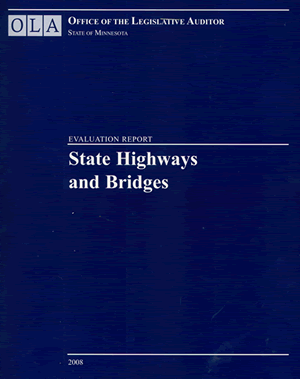
The Office of the Legislative Auditor Feb. 19 released its latest report on the state of Minnesota’s highways and bridges. |
The Office of the Legislative Auditor today released its latest report on the state of Minnesota’s highways and bridges, noting both strengths and weaknesses in the way Mn/DOT manages its transportation investment program.
The 121-page report focused on three areas of transportation: highways, bridges and investment management.
“Mn/DOT is a better and stronger agency today because of the good work of our professional staff to improve our planning functions, establish clear investment criteria and priorities, and report regularly on the financial circumstances facing Minnesota’s transportation system,” said Lt. Gov./Commissioner Carol Molnau, who was invited to respond to the audit's findings and recommendations at a Feb. 19 hearing of the Legislative Audit Commission.
“Mn/DOT has embraced the recommendations and is already working on implementation,” she said. “Audits such as these provide valuable objective review and insight and serve as catalysts to improve business practices.”
In his remarks, Legislative Auditor Jim Nobles said there were “a few bright spots,” including the fact that Mn/DOT has made many improvements since the Legislative Auditor’s last report in 1997. Those improvements include:
- Establishing target performance levels for bridge and pavement condition
- Developing a method to plan for future bridge performance needs and improving tools for predicting future pavement condition needs
- Reporting regularly the resources needed to achieve target performance levels
- Establishing pavement and bridge preventive maintenance programs
However, the report noted that the department still needs to better align spending with projects that preserve the state’s existing infrastructure (Mn/DOT’s top priority) as well as improving its processes for project scoping and cost estimating, program delivery and debt management.
“We must do an even better job of aligning our investments, project-by-project, with our stated priorities—and we will,” Molnau said.
|



